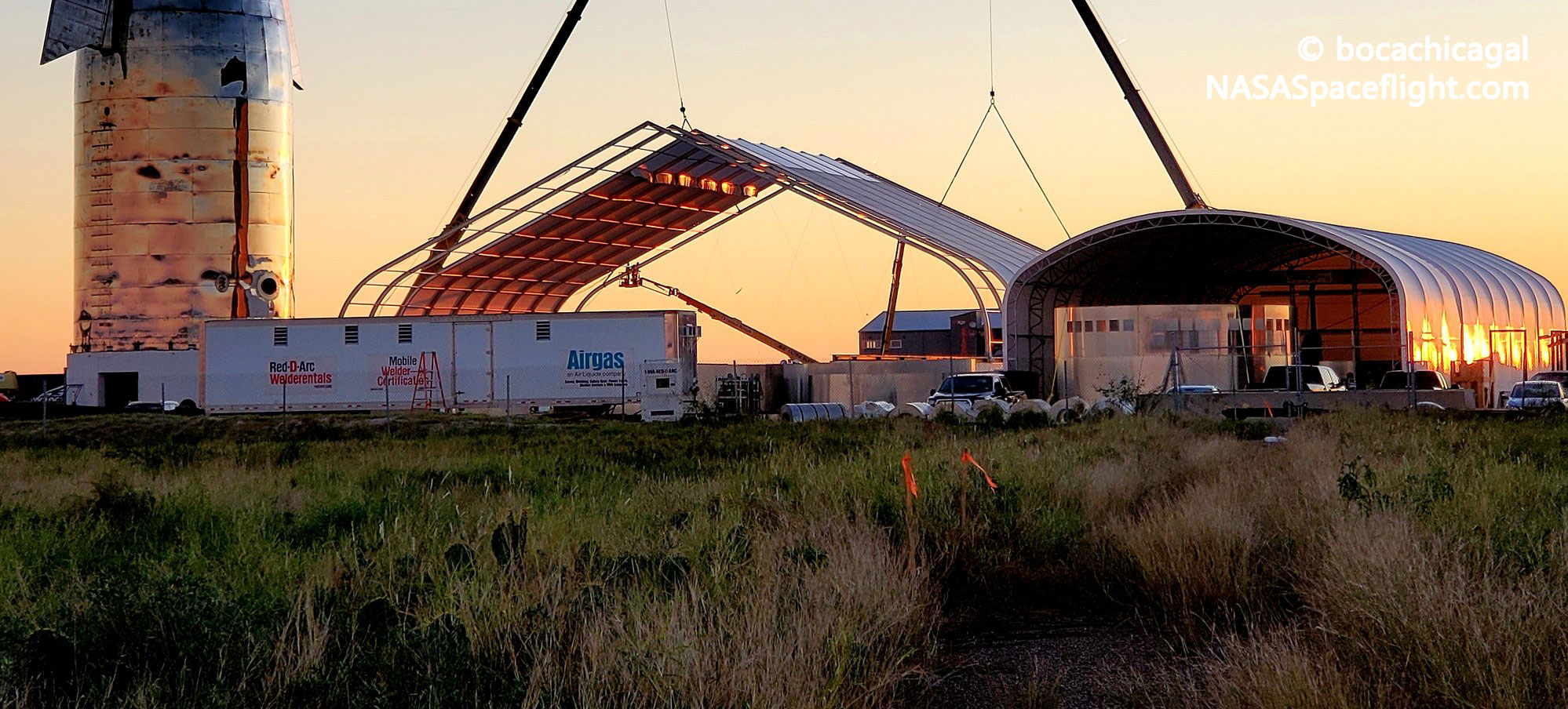
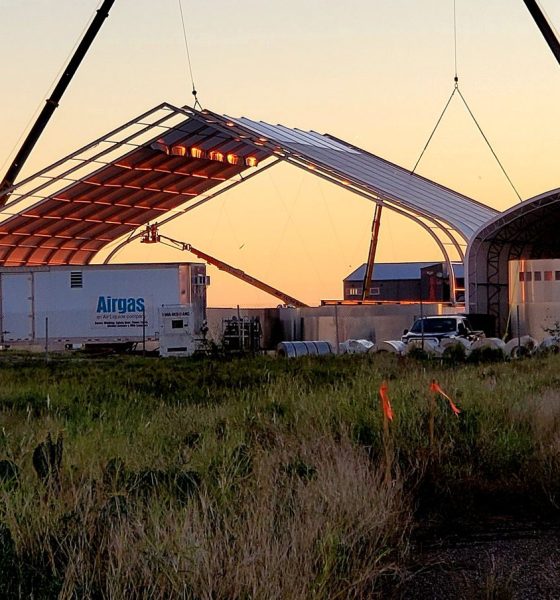
News
SpaceX borrows Tesla's tent factory strategy for new Starship production HQ
Confirmed yesterday morning by CEO Elon Musk, SpaceX has copied Tesla’s approach to factory expansion and is building a giant tent to upgrade its South Texas Starship production facilities.
A big step towards more traditional aerospace-style manufacturing facilities, SpaceX has contracted the same company used by Tesla to create a fourth general assembly line (GA4) in a giant tent outside its Fremont, CA factory in 2018. Instead of Model 3s, however, Sprung Instant Structures (Sprung for short) is rapidly raising a large tent that will eventually allow SpaceX to fabricate and weld more Starship parts and sections in an enclosed environment, an improvement from the current practice of building prototypes out in the harsh environment of coastal Texas.
In typical fashion, Musk believes that the new enclosed production facilities – just a collection of shipping crates as of December 18th – could be ready to begin manufacturing Starship parts as early as next month, and the progress Sprung has made makes it unusually hard to fault his optimism.
Likely taken in mid-December, aerial photos taken by pilot and photographer Sam Sun help sketch out a rough view of the prospective Starship factory. SpaceX appears to have almost entirely foregone a concrete foundation for the new tent, instead opting for lines of steel shipping containers that likely add a bit of height at the cost of structural stability.
.@BocaChicaGal covers the work at these sites extensively, but here's a peek over the fence 😉 pic.twitter.com/0eDJp2agqr— Sam Sun (@BirdsNSpace) December 29, 2019
According to figures printed right on one of Sprung Structures’ many shipments of materials, the initial building will measure approximately 45 meters (150 ft) wide, 77 meters (255 ft) long, and 18 meters (60 ft) tall. While Tesla’s GA4 tent is the same width and (mostly) height, it’s an impressive 280 meters (915 ft) long – almost four times bigger than SpaceX’s newest Boca Chica addition.
While the shipping container foundation is definitely a bit of a risk a mile from the Gulf of Mexico, it does mean that SpaceX might actually be able to move the shell of its new Starship factory if the need arises. SpaceX is in the midst of expanding its Boca Chica lots, potentially giving the company a lot more space to grow its enclosed factory down the road. The simplest possible expansion available would basically double the length of the existing structure, making it more like 150-180 meters (500-600 ft) long.
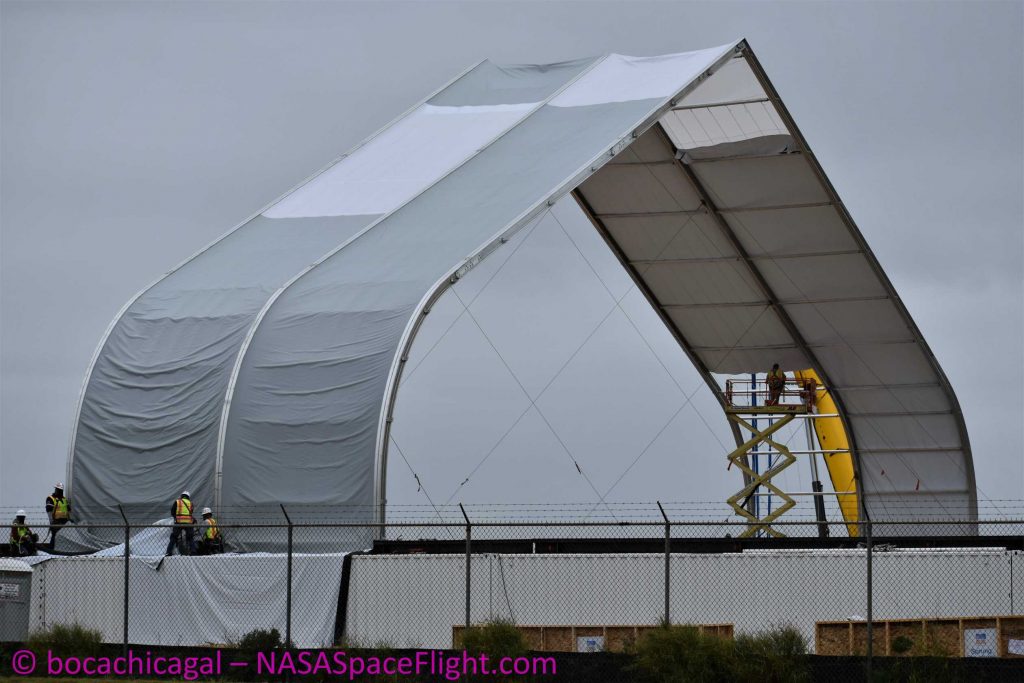
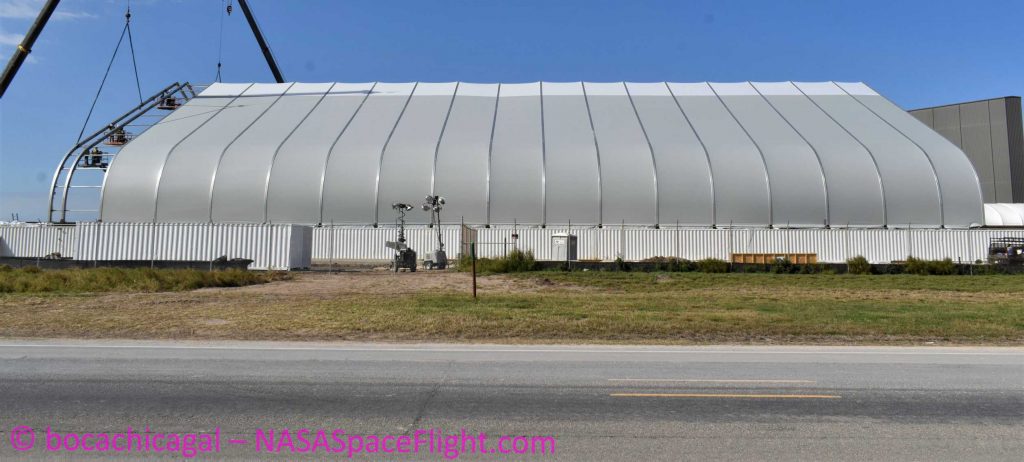
Regardless, even the current 150′ x 255′ enclosure will end up offering more than 38,000 ft² (3500 m²) of factory space once finished. Depending on what its primary purpose is, SpaceX could probably fit 5-8 stacks of 5-6 rings each (10-11m tall) down the center of the tent, with room for maybe 10-24 additional stacks of 2-3+ rings (3.5-5m tall) in the space remaining. The middle line of hypothetical rings could produce the entire barrel section of 1-2 Starships simultaneously, leaving perhaps 3-4 large sections to be welded together out in the elements or at SpaceX’s new wedge-shaped windbreak.
Of course, the facility will likely end up being mixed-use, potentially offering enough space to simultaneous fabricate all subsections of a single Starship prototype before they are assembled elsewhere.
Ultimately, Sprung is now in the process of installing a large quantity of insulation inside the tent’s walls, indicating that SpaceX’s South Texas welding crew may soon be blessed with a climate-controlled work environment. Meanwhile, SpaceX CEO Elon Musk believes that Boca Chica’s new tent could be complete and ready to begin building Starship hardware as soon as January 2020, while he says that the next Starship prototype – now known as Starship SN01 (serial number 01) – could be ready for flight testing just one or two months after that.
Check out Teslarati’s Marketplace! We offer Tesla accessories, including for the Tesla Cybertruck and Tesla Model 3.

News
Tesla lands massive deal to expand charging for heavy-duty electric trucks
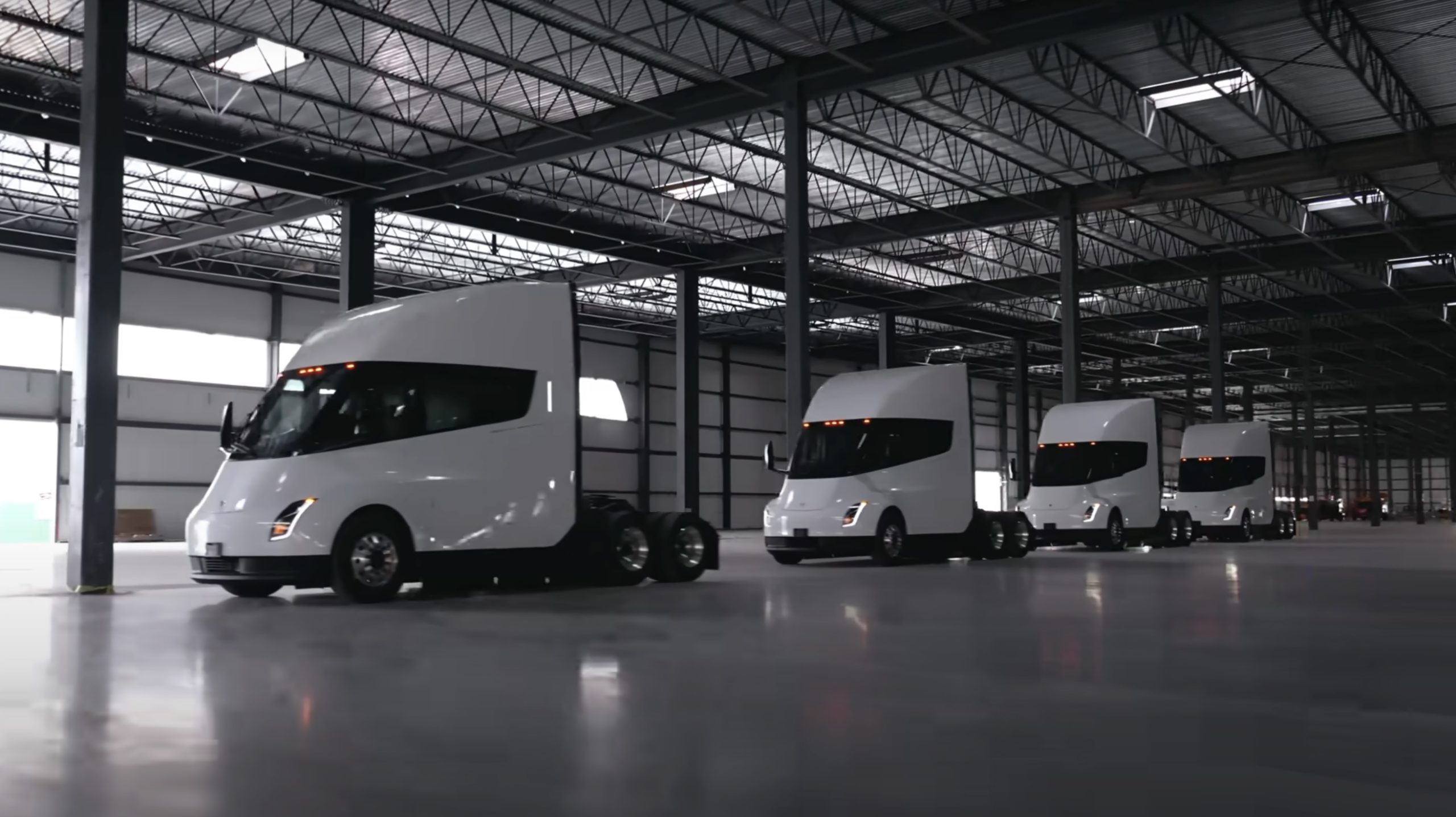
Tesla has landed a massive deal to expand its charging infrastructure for heavy-duty electric trucks — and not just theirs, but all manufacturers.
Tesla entered an agreement with Pilot Travel Centers, the largest operator of travel centers in the United States. Tesla’s Semi Chargers, which are used to charge Class 8 electric trucks, will be responsible for providing energy to various vehicles from a variety of manufacturers.
The first sites are expected to open later this Summer, and will be built at select locations along I-5 and I-10, major routes for commercial vehicles and significant logistics companies. The chargers will be available in California, Georgia, Nevada, New Mexico, and Texas.
Each station will have between four and eight chargers, delivering up to 1.2 megawatts of power at each stall.
The project is the latest in Tesla’s plans to expand Semi Charging availability. The effort is being put forth to create more opportunities for the development of sustainable logistics.
Senior Vice President of Alternative Fuels at Pilot, Shannon Sturgil, said:
“Helping to shape the future of energy is a strategic pillar in meeting the needs of our guests and the North American transportation industry. Heavy-duty charging is yet another extension of our exploration into alternative fuel offerings, and we’re happy to partner with a leader in the space that provides turnkey solutions and deploys them quickly.”
Tesla currently has 46 public Semi Charger sites in progress or planned across the United States, mostly positioned along major trucking routes and industrial areas. Perhaps the biggest bottleneck with owning an EV early on was charging availability, and that is no different with electric Class 8 trucks. They simply need an area to charge.
Tesla is spearheading the effort to expand Semicharging availability, and the latest partnership with Pilot shows the company has allies in the program.
The company plans to build 50,000 units of the Tesla Semi in the coming years, and with early adopters like PepsiCo, DHL, and others already contributing millions of miles of data, fleets are going to need reliable public charging.
🚨 Pilot working with Tesla to install and expand Semi Chargers is a perfect example of two industry leaders working together for the greater good.
As more commerce companies expand into EVs, Semi Charger will be more commonly available for electrified fleets, making efforts… pic.twitter.com/VPLIYyq15b
— TESLARATI (@Teslarati) January 27, 2026
Tesla is partnering with other companies for the development of the Semi program, most notably, a conglomeration with Uber was announced last year.
Tesla lands new partnership with Uber as Semi takes center stage
The ride-sharing platform plans to launch the Dedicated EV Fleet Accelerator Program, which it calls a “first-of-its-kind buyer’s program designed to make electric freight more affordable and accessible by addressing key adoption barriers.”
The Semi is one of several projects that will take Tesla into a completely different realm. Along with Optimus and its growing Energy division, the Semi will expand Tesla to new heights, and its prioritization of charging infrastructure.
Elon Musk
Elon Musk’s Boring Company opens Vegas Loop’s newest station
The Fontainebleau is the latest resort on the Las Vegas Strip to embrace the tunneling startup’s underground transportation system.
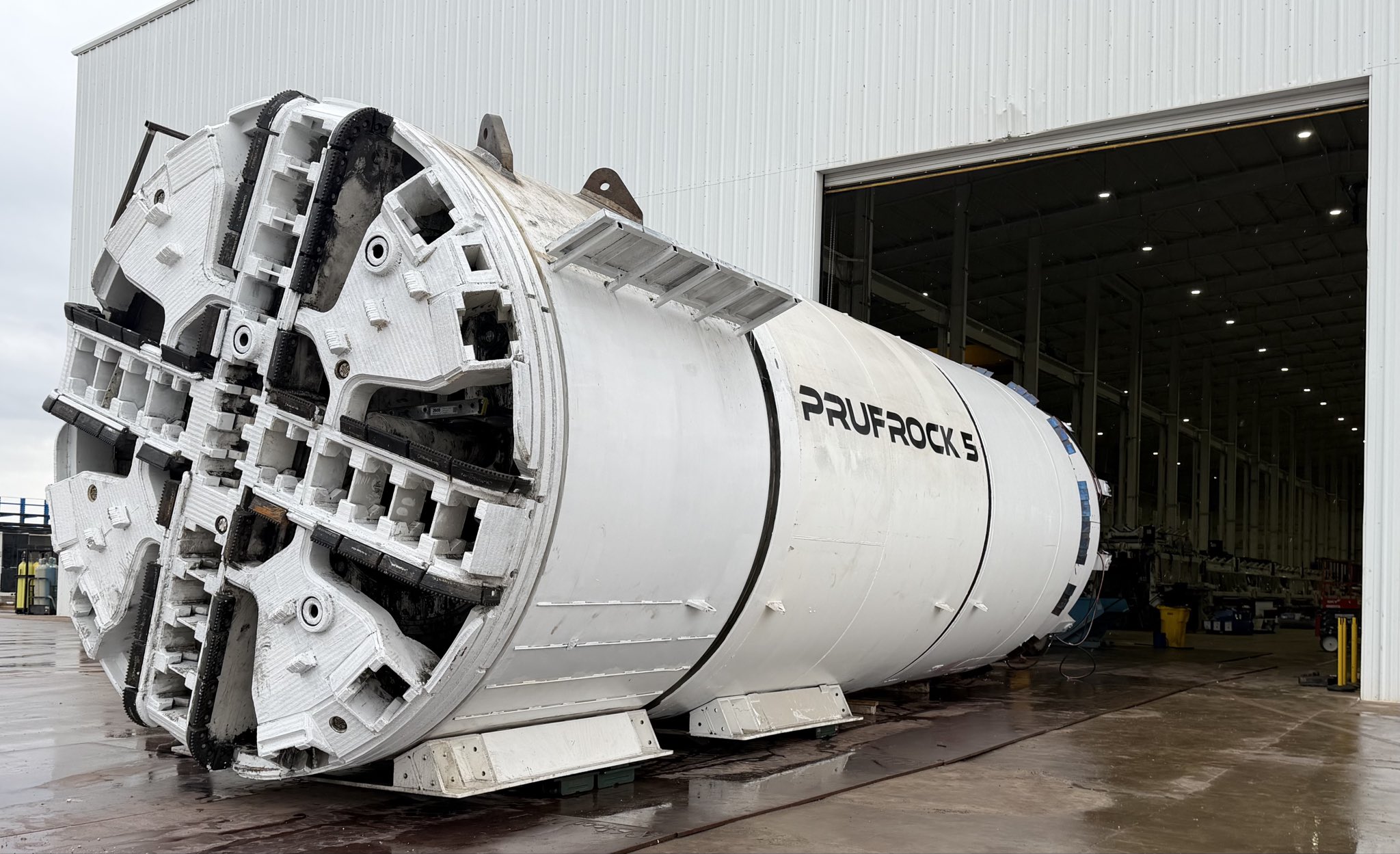
Elon Musk’s tunneling startup, The Boring Company, has welcomed its newest Vegas Loop station at the Fontainebleau Las Vegas.
The Fontainebleau is the latest resort on the Las Vegas Strip to embrace the tunneling startup’s underground transportation system.
Fontainebleau Loop station
The new Vegas Loop station is located on level V-1 of the Fontainebleau’s south valet area, as noted in a report from the Las Vegas Review-Journal. According to the resort, guests will be able to travel free of charge to the stations serving the Las Vegas Convention Center, as well as to Loop stations in Encore and Westgate.
The Fontainebleau station connects to the Riviera Station, which is located in the northwest parking lot of the convention center’s West Hall. From there, passengers will be able to access the greater Vegas Loop.
Vegas Loop expansion
In December, The Boring Company began offering Vegas Loop rides to and from Harry Reid International Airport. Those trips include a limited above-ground segment, following approval from the Nevada Transportation Authority to allow surface street travel tied to Loop operations.
Under the approval, airport rides are limited to no more than four miles of surface street travel, and each trip must include a tunnel segment. The Vegas Loop currently includes more than 10 miles of tunnels. From this number, about four miles of tunnels are operational.
The Boring Company President Steve Davis previously told the Review-Journal that the University Center Loop segment, which is currently under construction, is expected to open in the first quarter of 2026. That extension would allow Loop vehicles to travel beneath Paradise Road between the convention center and the airport, with a planned station located just north of Tropicana Avenue.
News
Tesla leases new 108k-sq ft R&D facility near Fremont Factory
The lease adds to Tesla’s presence near its primary California manufacturing hub as the company continues investing in autonomy and artificial intelligence.
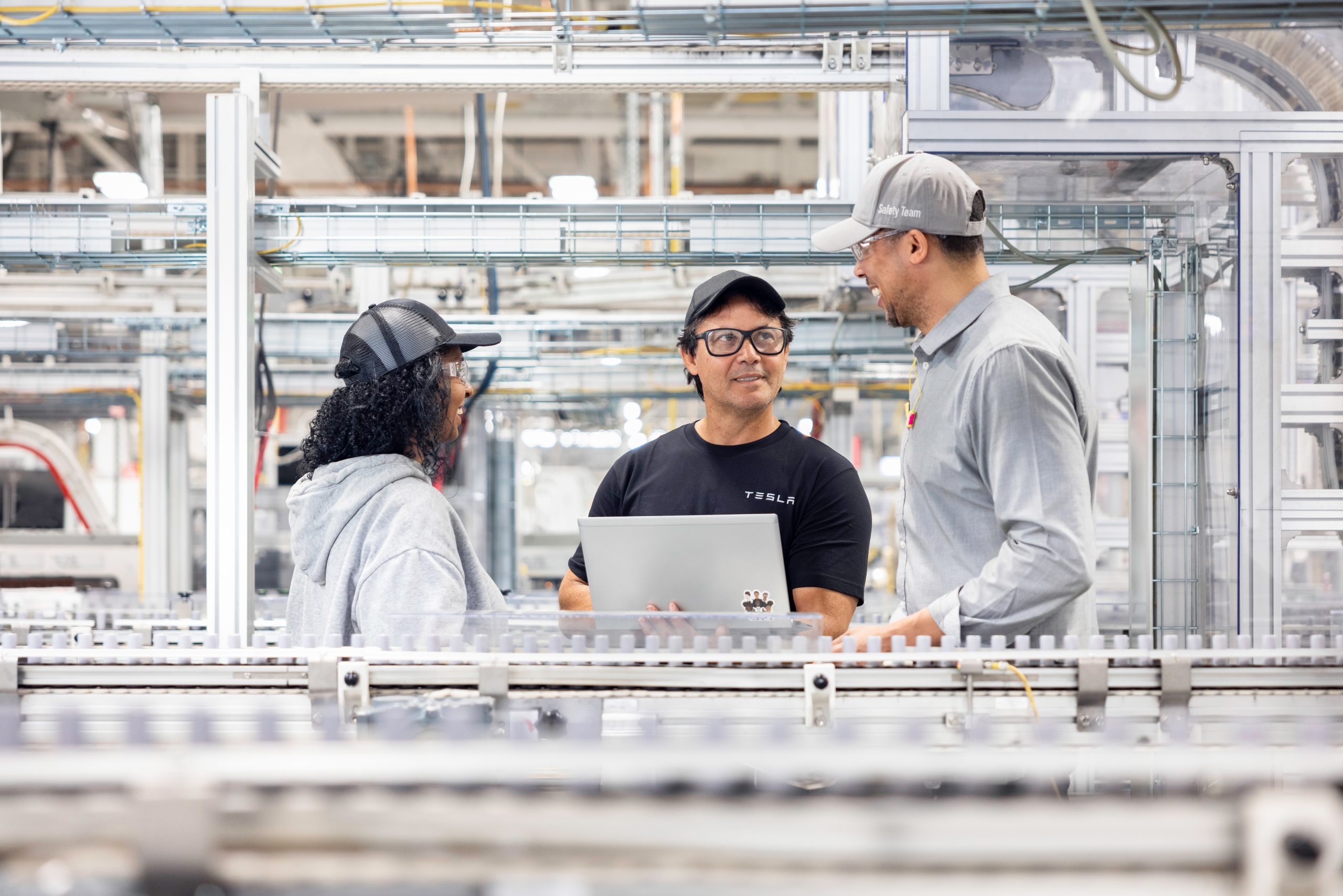
Tesla has expanded its footprint near its Fremont Factory by leasing a 108,000-square-foot R&D facility in the East Bay.
The lease adds to Tesla’s presence near its primary California manufacturing hub as the company continues investing in autonomy and artificial intelligence.
A new Fremont lease
Tesla will occupy the entire building at 45401 Research Ave. in Fremont, as per real estate services firm Colliers. The transaction stands as the second-largest R&D lease of the fourth quarter, trailing only a roughly 115,000-square-foot transaction by Figure AI in San Jose.
As noted in a Silicon Valley Business Journal report, Tesla’s new Fremont lease was completed with landlord Lincoln Property Co., which owns the facility. Colliers stated that Tesla’s Fremont expansion reflects continued demand from established technology companies that are seeking space for engineering, testing, and specialized manufacturing.
Tesla has not disclosed which of its business units will be occupying the building, though Colliers has described the property as suitable for office and R&D functions. Tesla has not issued a comment about its new Fremont lease as of writing.
AI investments
Silicon Valley remains a key region for automakers as vehicles increasingly rely on software, artificial intelligence, and advanced electronics. Erin Keating, senior director of economics and industry insights at Cox Automotive, has stated that Tesla is among the most aggressive auto companies when it comes to software-driven vehicle development.
Other automakers have also expanded their presence in the area. Rivian operates an autonomy and core technology hub in Palo Alto, while GM maintains an AI center of excellence in Mountain View. Toyota is also relocating its software and autonomy unit to a newly upgraded property in Santa Clara.
Despite these expansions, Colliers has noted that Silicon Valley posted nearly 444,000 square feet of net occupancy losses in Q4 2025, pushing overall vacancy to 11.2%.








